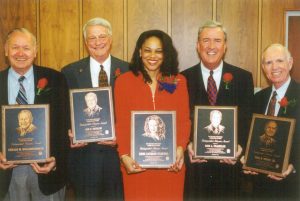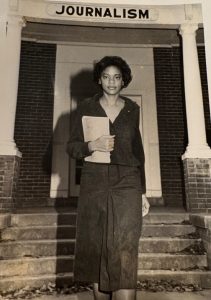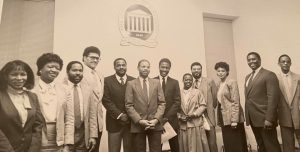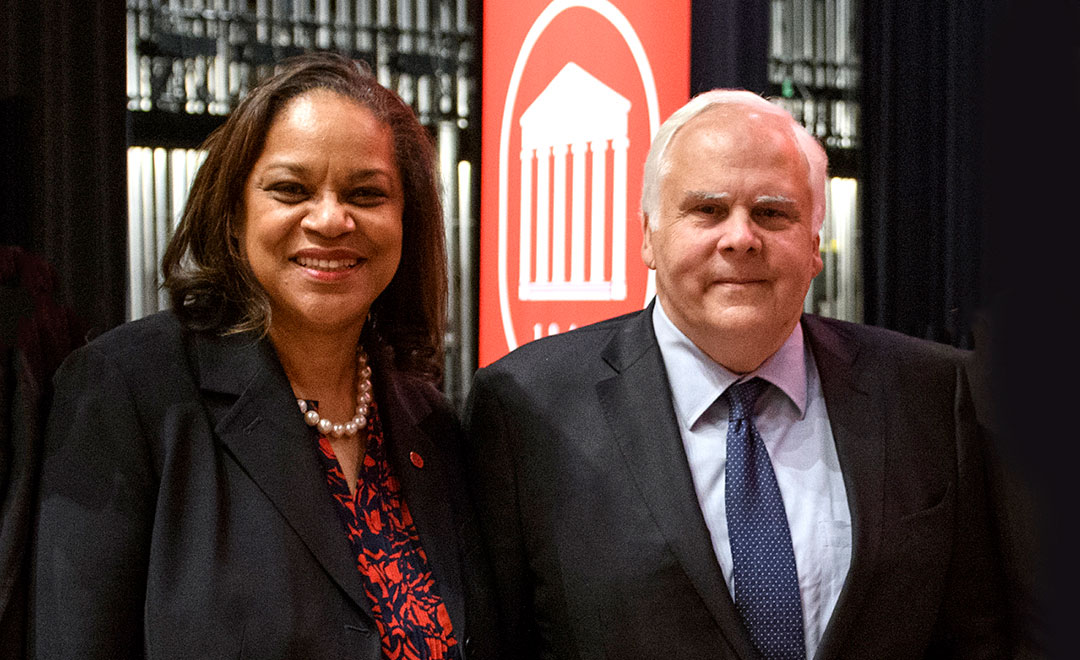A student support fund has been established in the Overby Center for Southern Journalism and Politics in honor of Rose Jackson Flenorl (’79), manager of global citizenship at the FedEx Corporation and an alumna of the University of Mississippi.

“There is nothing I would rather have than something that supports students,” Flenorl said when she learned of the fund. “I am grateful to the donors for their generosity. I am hopeful others will contribute because I know firsthand how scholarships make a difference and help our students.”
Her love for students and the University of Mississippi has been evident since she first set foot on the campus during the spring of 1975 when outstanding African American high school seniors were invited from throughout Mississippi.
“I visited on a recruiting weekend,” she said. “I had a chance to sit in some journalism classes and talk to some professors.”
During the fall of 1975 fewer than 400 students were African Americans in a student body of about 8,500 on the Oxford campus.
She heard students talk. “They would say, ‘You may be the only person of color in the classroom,’” Flenorl said.
They also told about the quality of the academics and the networks that they built and the experiences that students had.
Otis Sanford (’75), former managing editor of The Commercial Appeal and professor emeritus at the University of Memphis, was a journalism major. He remembers Flenorl from those recruiting visits.
“I knew then that Rose had all the leadership qualities,” Sanford said. “I knew then that she was going to be a success no matter what she chose to do, whether it was in journalism or whether it was in corporate America.”
Before she left campus that weekend she knew that the university was the place for her. “At the time, Ole Miss was the only accredited program in journalism in the state of Mississippi.”
However, before she enrolled, she needed her parents’ blessing, and both Louis and Mertha Jackson were graduates of Jackson State University.
When Flenorl talked to them about her intentions, her dad listened and said, “We’ll talk about it.”
She understood that meant her parents were not convinced, and she wanted to know why.
Flenorl said she told her parents, “You have told me my whole life that with confidence and hard work and belief in God, I could accomplish anything. Were you telling me the truth?”
Her question led to her parents’ blessing and encouragement, and Flenorl enrolled that fall and immediately became involved in student life.

She often was the only African American in the room, but she was a major in journalism and worked on The Daily Mississippian. She met Becky Jones, another journalism major. Jones’ roommate was running for president of the Association for Women Students. Flenorl worked on that campaign and met a lot of students. In fact, she seemed to be everywhere on campus.
Ron Agnew (’84), general manager of New Jersey Advance Media and former executive editor of The Clarion-Ledger, said she had the kind of presence “that when you get on campus, everybody says, ‘Well, have you met Rose?’ Eventually, there probably isn’t a person that I know at Ole Miss who didn’t come across Rose in some way.”
She was the first Black elected president of the Association for Women Students, the first Black to be elected campus favorite, and the first Black selected as Mortar Board Sophomore Honor Girl. She was a University Ambassador, a University Scholar, a Homecoming Maid, a Rebel Recruiter, and a member of Alpha Lambda Delta, Lambda Sigma, and Phi Kappa Phi honor societies. She also was ASB press secretary and elected student representative to the board of the Society of Professional Journalists at its national convention in Detroit. She was the first Black female admitted to Omicron Delta Kappa Honorary, and she was the first Black woman selected to the student and alumni Hall of Fame.
The university displays photographs of the members of the graduating class who are selected for the Hall of Fame. Through the years those in the Hall of Fame have distinguished themselves in society. They have been leaders in government, education, medicine, business, etc.
“When I was a freshman I saw the display,” Rose said, “and I thought to myself, ‘What did they do at 21, 22 years old that someone projected the fact that they would be successful in life?’ I was looking at the wall, I turned to my friends and said that one day I’d love to be on the wall.
“One person looked at me, ‘Do you see anybody on the wall that looks like you?’” At the time, there had never been an African American female in the Hall of Fame. There had only been one African American male.
“I feel like Ole Miss allows you to be well-rounded, so I knew I had to make my grades. There has to be a first. You have to have the academics in order to graduate. I wanted things that aligned with me professionally so that a four-year experience would not only be about the classroom, but what real-life experiences are like for a journalist.”
During the summer before her senior year she had an internship at Hodding Carter’s highly respected Delta Democrat Times in Greenville, Miss. Then in August, Glamour magazine named Flenorl among its top female graduates in the nation.
“When I told them that she had been on 23 campuswide committees, the editors were stunned,” Will Norton said. Now retired as dean emeritus of the College of Journalism and Mass Communications at the University of Nebraska-Lincoln and senior fellow emeritus of the Overby Center, Norton was chair of the Department of Journalism when Flenorl was a student.
Before she graduated, Flenorl had two job offers: A position on President Jimmy Carter’s White House staff and a reporting job on The Commercial Appeal.
“I made our alumni in Washington unhappy because I told Rose to take the job at The Commercial Appeal,” Norton said. “We needed people with her talent to stay in the region and make a difference.”

She took the Memphis position, but after a few months, University of Mississippi Chancellor Porter Fortune hired her as assistant director for Student Affairs. She left a position with a big future in the newspaper business for a very challenging job at the university.
“She could talk you through the situations,” Agnew said. “There are some people who basically are wise beyond their years, and when we were on campus together, Rose was wise beyond her years.”
“When I graduated, I stayed very active with the alumni association,” Flenorl said. “The presidential debates were on campus when I was vice president.”
She represented Ole Miss in media from all over the world. She was the first African American elected president of the University of Mississippi Alumni Association. She was the first African American to be president of the University of Mississippi Foundation.
Chancellor Emeritus Robert Khayat is effusive about Flenorl’s work with the university both as an undergraduate and an alumna. “She’s been real positive in my life personally,” Khayat said. He calls Flenorl, James Meredith and Don Cole transformational individuals.
Charles Overby, chairman of the Overby Center for Southern Journalism and Politics, said Flenorl is “a classic example of somebody who knows how to deal with people. She brought a lot of those qualities to Ole Miss as a young student, and she honed those qualities while at Ole Miss.
“To have a scholarship that honors someone like Rose makes it really special,” Overby said. “She has influenced hundreds of students here at Ole Miss by her example.”
The University of Mississippi is indeed fortunate that Mr. and Mrs. Jackson inculcated in their oldest daughter a belief that she could accomplish anything because she believed in God, confidence and hard work.
“When she was in Student Affairs she helped all students get acclimated,” Agnew said. “And as an alum she has welcomed everyone who has come back.”
For decades to come, students on the Oxford campus will benefit from her and from the fund in her honor.
She is and will continue to be a presence.
The Rose Jackson Flenorl Endowment will be administered by the chair of the Overby Center. Contributions to the fund can be made by mailing checks to the Overby Center for Southern Journalism and Politics, 555 Grove Loop, Suite 247, University, MS 38677, attention Claressa Pettis.
By Emily O’Reilly/Overby Center for Southern Journalism and Politics

